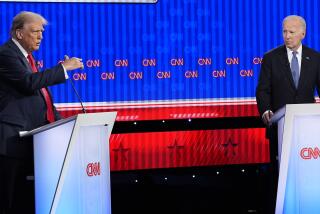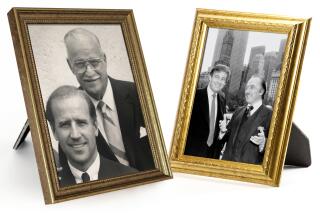Bush’s Iraq Stance Hints at a Bid to Settle Old Score
WASHINGTON — As President Bush seeks to mount an anti-Iraq coalition, his rhetoric against Iraqi President Saddam Hussein suggests that his desire for a “regime change” in Baghdad includes a strong dose of personal enmity.
And that would not be surprising, given Bush has shown that personal considerations can influence his words and deeds, whether it’s rewarding friends or punishing foes.
With his recent condemnations of Hussein as not only a dictator who poses “a grave and gathering danger” to the world but also someone who tried to assassinate Bush’s father, the president has added to the perception that he is out to settle an old score.
“After all, this is a guy that tried to kill my dad at one time,” Bush told an audience in Houston last week. He also referred to the 1993 Iraqi assassination attempt during his Sept. 12 address to the U.N. General Assembly. And the elder Bush declared in a recent CNN interview: “I hate Saddam Hussein.”
White House aides dismiss talk of a Bush family grudge. “Look, obviously, one doesn’t want to appear to personalize this,” one senior administration official said.
But the president’s single-mindedness has fueled the suspicion that his push to oust Hussein is motivated, if only in part, by an urge to finish a job that his father started as president with the Persian Gulf War in 1991.
“You can see how some people perceive it as revenge. On the other hand, [administration officials] will never admit it,” said Bruce Buchanan, a University of Texas presidential historian. “But it probably figures in there as some small, private pleasure.”
Some who have crossed Bush over the years believe that he not only can nurse grudges, but also deliver paybacks--a trait that German Chancellor Gerhard Schroeder may be discovering.
Waging a fiercely anti-U.S. campaign helped Schroeder narrowly win a reelection bid last month. In addition, his justice minister allegedly said that Bush was talking of war to distract Americans from a weak economy in much the same way Adolf Hitler did. Even though she later resigned, the incidents angered Bush, a man who prizes loyalty.
Also, Bush’s decision this year to call for Yasser Arafat’s ouster is widely viewed as having been partially motivated by what the president considered personal betrayals by the Palestinian leader, such as lying about arms shipments from Iran.
“He works very hard to establish a rapport and find a common interest. But he also holds people to a very high standard. If they’re not supportive, he will not be restrained in his criticism of them,” said Craig Fuller, a Washington lobbyist who served as chief of staff when Bush’s father was vice president in the Reagan administration. Among those who have encountered Bush’s hard-nosed approach are Sen. John McCain (R-Ariz.)--who contested Bush for the GOP presidential nomination in 2000 and who on many issues remains a thorn in his side--and those who worked in McCain’s campaign.
The Bush White House “went out of its way to make sure McCain people had a hard time finding work in the administration or elsewhere in Republican politics,” said a senior GOP congressional staffer. McCain eventually brought up the matter privately with Bush but to no avail.
McCain was subjected to a high-profile White House snub after the passage this year of the campaign finance reform bill he long had championed.
Given that most Republicans and Bush vehemently opposed the measure’s key provisions, a grand bill-signing ceremony was never expected. McCain “knew there wouldn’t be one,” said Mark Salter, the senator’s chief of staff.
But McCain didn’t even rate advance notice, as Bush signed the measure without fanfare early one morning and then left town. The job of informing McCain fell to a young staffer in the office of Nicholas E. Calio, the White House legislative director. McCain was home in Arizona sound asleep when the call came--at 6 a.m.
Bush never has been shy about being blunt.
In the mid-1980s, as his father--then vice president under Ronald Reagan--was contemplating a presidential bid, the younger Bush confronted the late Lee Atwater, a flamboyant, take-no-prisoners Republican strategist. Bush told him that he intended to monitor Atwater’s commitment and loyalty to his father.
In late 1987, after Newsweek published a negative cover story on his father, titled “Fighting the Wimp Factor,” Bush told a senior magazine staffer: “Newsweek’s been cut off. You’re out of business.”
Last month, the White House canceled an interview that First Lady Laura Bush was to give to U.S. News & World Report after the newsweekly reported on the Secret Service protection for the first couple’s twin daughters.
Many longtime Bush watchers believe that Bush in 1994 challenged incumbent Texas Gov. Ann Richards, a Democrat, in large part because of her oft-quoted quip in a speech at the 1988 National Democratic Convention that his father had been “born with a silver foot in his mouth.”
As Richards telephoned to concede on election night, “a massive smile” spread across Bush’s face, according to Bill Minutaglio, author of “First Son,” a 1999 biography of Bush.
In the recent rupture with Schroeder, Bush’s anger was quickly evident--the president departed from protocol by not calling to congratulate the chancellor.
Defense Secretary Donald H. Rumsfeld, in Warsaw for a North Atlantic Treaty Organization conference shortly afterward, snubbed his German counterpart. At the White House, National Security Advisor Condoleezza Rice declared that Schroeder had “poisoned” the atmosphere between Washington and Berlin.
Few doubt that the U.S.-German relationship, given its strategic importance, will right itself. But many German officials believe that some Bush payback is inevitable--a fear that the White House has not sought to allay.
“Nobody should be under any illusions or mistakes that, now that the election is over, that everything goes back to the way it was,” said White House Press Secretary Ari Fleischer.
“Some people in Texas say: ‘Forgive and remember,’ ” said Garnet Coleman, a Democratic Texas state lawmaker who observed, close up, Bush’s style when he was governor. “We know the history of the Bush family: In a competitive world, you may lose this battle, but the issue is whether you win the war.”
More to Read
Get the L.A. Times Politics newsletter
Deeply reported insights into legislation, politics and policy from Sacramento, Washington and beyond. In your inbox three times per week.
You may occasionally receive promotional content from the Los Angeles Times.










